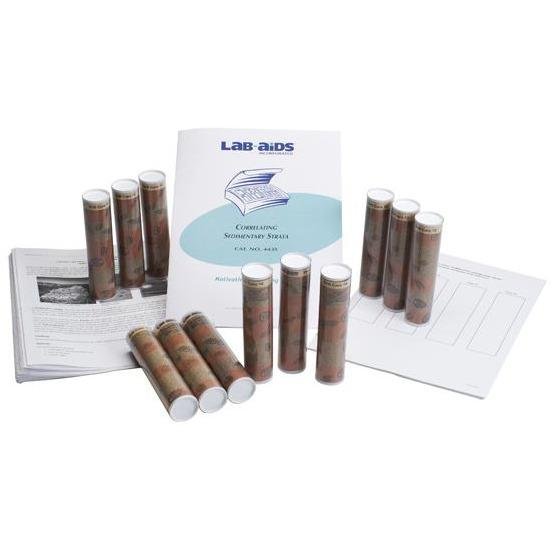Lab-Aids: Correlating Sedimentary Strata Kit
Student groups use four unique LAB-AIDS‚® Simulated Drill Cores, each representing a fictitious series of rock layers from a different location. They then use the evidence from each drill core to create a stratigraphic column - diagram of the rock layers and the fossils they contain - for each locality. Based on the fossils contained within the layers, students are asked to determine how the layers in each locality correlate to the layers from the other localities. They are then challenged to use this fossil evidence to construct a timeline showing the relative time spans of each species represented by the fossils. Developed by SEPUP.
Scientific Concepts:
- Similar sequences of rock layers, including the fossils within them, are found in different geographical locations, some quite far apart
- Relative ages of rock layers are determined by the "law of superposition", which states that in a series of rock layers, each layer is younger than the one below it
- Over time, the environment and associated ecosystem of a given area can change and these changes are reflected in the rocks and fossils
- An observation is an objective description, whereas an inference is an interpretation based upon observations
Content List:
- 1 Teacher's Guide
- 28 Student Worksheets and Guides
- 28 Student Sheet: Stratigraphy of the Drill Cores
- 3 Simulated drill core 1, LAB-AIDS‚®
- 3 Simulated drill core 2, LAB-AIDS‚®
- 3 Simulated drill core 3, LAB-AIDS‚®
- 3 Simulated drill core 4, LAB-AIDS‚®
- 1 Transparency 1: Correlation of Rock Layers
- 1 Transparency 2: Timeline for Fossils
Classroom Planning:
- To complete this kit requires one to two ~50-minute class periods
- Number of Students: 24














